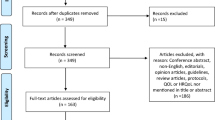Abstract
Few cross-cultural measures are available to assess quality of life (QoL) in HIV/AIDS. A short form of the WHOQOL-HIV—the WHOQOL-HIV BREF—was developed and tested. Survey data from 1,923 HIV-positive adults (selected for age, gender and disease stage) were collected in 8 culturally diverse centres. The ‘best’ HIV-specific item was extracted from five HIV facets of the WHOQOL-HIV long form using information about item correlations with QoL, health and domains, item discriminant validity and centre problems. The five identified items were then integrated with the WHOQOL-BREF to complete the 31 item WHOQOL-HIV BREF. This short form shows good internal consistency reliability and discriminant validity for ‘known’ disease stages. Confirmatory Factor Analysis showed an overall good fit for a six domains model (Comparative Fit Index = 0.97), supporting scoring. Quality of life in different cultures is reported. A value of the WHOQOL-HIV short form is in monitoring QoL in multi-national clinical trials, and in clinical practice.

Similar content being viewed by others
References
UNAIDS Outlook. http://data.unaids.org/pub/Report/2009/ (2010). Accessed May 1, 2009.
Van Rensburg MSJ, Jansen MS. Measuring the quality of life of residents in SADC communities affected by HIV. AIDS Care. 2009;21(9):1132–40.
O’Connell KA, Skevington SM. To measure or not to measure? Reviewing the assessment of spirituality and religion in health-related quality of life. Chronic Illn. 2007;3(1):77–87.
Skevington SM, Sartorius N, Amir M, the WHOQOL Group. Developing methods for assessing quality of life in different cultural settings: the history of the WHOQOL instruments. Soc Psychiatry Psychiatr Epidemiol. 2004;39(1):1–8.
The WHOQOL-HIV Group. Initial steps to developing the World Health Organisation’s quality of life instrument (WHOQOL) module for international assessment in HIV/AIDS. AIDS Care. 2003;15(3):347–57.
The WHOQOL Group. The World Health Organisation’s Quality of Life assessment (WHOQOL): position paper from the World Health Organisation. Soc Sci Med. 1995;41(10):1403–9.
Preau M, Marcellin F, Spire B, et al. Impaired anger control as an underappreciated side-effect of treatment for chronic HCV infection in HIV-HCV co-infected patients. J Clin Gastroenterol. 2008;42(1):92–6.
Deribew A, Tesfayo M, Hailmichael Y, et al. Tuberculosis and HIV co-infection: its impact on quality of life. Health Qual Life Outcomes. 2009;7(105):1–7.
O’Connell KA, Saxena S, Skevington SM. For the WHOQOL-HIV Group WHOQOL-HIV for quality of life assessment among people living with HIV and AIDS: results from the field test. AIDS Care. 2004;16(7):882–9.
International Centre for Research on Women (ICRW). UNAIDS. Technical meeting to consolidate HIV stigma measures and measurement tools. ICRW, Washington, DC; November 2009.
Skevington SM, Lotfy M, O’Connell KA. The World Health Organisation’s WHOQOL-BREF Quality of Life Assessment: psychometric properties and results of the international field trial—a report from the WHOQOL Group. Qual Life Res. 2004;13(2):299–310.
O’Connell KA, Skevington SM, Saxena S, the WHOQOL HIV Group. Preliminary development of the World Health Organisation’s Quality of Life HIV instrument (WHOQOL-HIV): analysis of the pilot version. Soc Sci Med. 2003;57(7):1259–75.
The WHOQOL Group. The World Health Organization’s Quality of Life Assessment (WHOQOL): development and general psychometric properties. Soc Sci Med. 1998;46:1569–85.
The WHOQOL Group. Development of the World Health Organization’s WHOQOL-BREF quality of life assessment. Psychol Med. 1998;28:551–8.
Streiner DL, Norman GN. Health measurement scales: a practical guide to their development and use. 2nd ed. Oxford: Oxford University Press; 1995.
Peltzer K, Phaswana-Mafuya N. Health-related quality of life in a sample of HIV-infected South Africans. AJAR. 2008;7(2):209–18.
World Health Organisation, South East Asia Regional Office (WHO/SEARO). Guidelines for conducting HIV behavioural surveillance—introducing behavioural surveillance. www.searo.who.int/2009/ (2009).
Bowden A, Fox-Rushby J. A systematic and critical review of the process of translation and adaptation of generic health-related quality of life measures in Africa, Asia, Eastern Europe, the Middle East and South America. Soc Sci Med. 2003;57(7):1289–306.
Acknowledgments
This paper was prepared by Prof Suzanne Skevington and Dr Kathryn O’Connell on behalf of the WHOQOL-HIV Group which comprises a coordinating group of collaborating investigators in each of the field sites, and a panel of consultants. At WHO the project was directed by Dr R. Billington, Dr J. Orley and Dr S. Saxena with technical assistance from Ms M. Lotfy. The field work reported here was carried out at the following centres: Mr M. Bartos, Centre for the Study of Sexually Transmissible Disease, Faculty of Health Sciences, La Trobe University, Victoria, Australia; Dr P. Chandra, National Institute of Mental Health & Neurosciences (NIMHANS), Bangalore, India; Dr M. Fleck, Department of Psychiatry & Legal Medicine, University of the State of Rio Grande do Sul, Porto Alegre, Brazil; Dr L. Bun Hor, NCHADS, Ministry of Public Health, Phnom Penh, Cambodia; Dr R. Bhargava, Department of Psychiatry, All India Institute of Medical Sciences, New Delhi, India; Prof F. Starace, Consultation Psychiatry & Behavioural Epidemiology Service, Naples, Italy; Dr S. Pkhidenko, Dniepropetrovsk State Medical Academy, Dniepropetrovsk, Ukraine; Dr K. Meesapya, Branch of Preventative Mental Health Technical Development, Department of Mental Health, Ministry of Public Health, Bangkok, Thailand; Dr A. Haworth, Department of Psychiatry, University of Zambia, Lusaka, Zambia; Dr J. Mutimbirwa, Department of Psychiatry, University of Zimbabwe, Harare, Zimbabwe. Analysis was conducted at University of Bath, UK, and WHO Geneva. Further information on the WHOQOL can be obtained at http://www.who.ch\msa\mnh\ql.htm and http://www.bath.ac.uk/whoqol.
Author information
Authors and Affiliations
Corresponding author
Electronic Supplementary Material
Below is the link to the electronic supplementary material.
Rights and permissions
About this article
Cite this article
O’Connell, K.A., Skevington, S.M. An International Quality of Life Instrument to Assess Wellbeing in Adults Who are HIV-Positive: A Short Form of the WHOQOL-HIV (31 items). AIDS Behav 16, 452–460 (2012). https://doi.org/10.1007/s10461-010-9863-0
Published:
Issue Date:
DOI: https://doi.org/10.1007/s10461-010-9863-0



